African Dawn Read online
Page 8
But they still appeared here, every now and then, with their attendant bangs and clatters and crashes. He'd learned already to be very wary of them. Others of his kind had died after the strangers had passed through. A huge explosion one night had sent him running like a scared calf to higher ground, but when he'd returned the next morning he'd found an old bull lying maimed, his right front foot missing. The old man was bleeding to death by the time Makuti got there. All he could do was watch while the other rhino died.
The one he was after, however, was very much alive, judging from the freshness of another urine mark Makuti detected. He stopped and swivelled his ears. From the other side of the thicket he heard the intruder's heavy breathing.
Leaves, dust and branches erupted in front of Makuti as the stranger burst from the thick jessie bush. The other male's horn would have pierced Makuti's flank had he not been quick enough to spin inside his own body length. The wicked weapon glanced off him and Makuti pivoted again to meet the next challenge.
Having lost the advantage of surprise, the foreigner paused, lifted his head and snorted.
Makuti was big for his age, but this bull was a brute. Perhaps five or more years older and a couple of hundred kilograms heavier, he was the largest of his kind that Makuti had ever challenged. Except what was becoming very clear to Makuti was that he was the one being challenged by the stranger, not the other way around. The old male had turned the tables in an instant and Makuti felt fear.
He exhaled through his nostrils and tried to square up and make himself look bigger. The other male lowered his head and charged again.
Makuti panicked. He didn't know whether to turn and flee or to stay and fight. His indecision almost killed him. While Makuti hesitated, the older bull dropped his head a fraction more; the two beasts collided and Makuti squealed as the old male's horn hooked up and under his jaw.
Makuti had been hurt in fights before, but never had he been taken so swiftly and so painfully. The horn had pierced the lower left side of his face and Makuti had to shake himself hard to free himself from the driving point. He yelled, the sound similar to that of an elephant trumpeting, as he turned and started to run.
But the intruder was fast, as well as big and strong. He kept pace with Makuti easily and his next thrust caught Makuti in the rear of his right thigh. Makuti's back leg was lifted off the ground by the move and he slid sideways in the cloud of dust they were both creating.
Makuti screamed again. He stumbled towards the river but the next toss of the stranger's head caught him under his other leg and he fell and rolled. A wave of dirt and debris flew up through the grass.
He twisted and turned, struggling to get back up on his feet, and his frantic movements saved his life. The intruder took his time – no more than a second or two – preparing for his killer blow, but when he thrust up with his horn, Makuti's writhing moved his heart out of the weapon's line and the tip merely scored the surface layers of his hide.
Makuti stood and realised there could be no more running. With both legs and his jaw bleeding he would be easily caught again by the interloper, who would run him down and skewer him from the rear. Makuti curled his tail over his arse at the terrible thought and bravely stood his ground.
The older rhino was breathing hard, but he was far from exhausted. He tossed his head, bellowed, and it was all Makuti could do to stay still and not turn and flee again. Makuti had his back to the river now. He hated the water and he never wanted to swim again as long as he lived. He had long since learned that rhinos were not meant to swim.
When the next charge came, Makuti was ready for it. He lowered his head even further than the old bull and when they collided he was as prepared as he could be for the impact. Still, the dust rose from their bodies and the clack of their horns colliding echoed down the length of the lower Zambezi.
Makuti didn't know, couldn't know, that this old Diceros bicornis was fighting for his life. He'd been chased from his home across the river in Zambia by men armed with AK-47 assault rifles. These two-legs were not fighting a war among themselves, as they were on Makuti's side of the Zambezi. These men were hunting the black rhinoceros for its horn. The stranger had nowhere else to go, except into Makuti's territory, but the black rhino is not a welcoming, forgiving or sociable creature. He is solitary, aggressive, unpredictable, and, when needs be, a killer.
Makuti thrust back and the intruder parried the blow. The two big males jostled each other through the sands at the river's edge. Makuti felt one of his back feet meet the water and this spurred him back up the beach's incline. He was not going in there.
Both were screaming now, and their high-pitched war cries sent smaller animals around them scurrying back into the grass and bush. None of them wanted to be caught under the feet of these battling titans.
Youth began to tell over experience. Makuti saw a gap and aimed for it. The older bull's reaction had slowed, and Makuti hooked him in the chest, between his two front legs. The thrust was not deep enough to cause fatal damage, but it winded his opponent, who yielded two steps.
Makuti seized the advantage and screamed again as he rammed the bridge of his head under the interloper's chin. He was almost eye to eye with his opponent and he found himself infused with a sense of power and will. This male was big, but Makuti was in his prime. The older bull's footing slipped in the soft sand of the bank, and when Makuti carried on, lifting his knees high, he found he was now perpendicular to his rival.
The old bull was not done yet, however. For Makuti to score another hit he would have to lower his head and disengage from the old bull. When he did, the elder dropped to one front knee and whirled his head around. The viciously fast move drove the point of the intruder's horn into the skin beneath Makuti's eye, almost tearing it out.
Makuti didn't try to pull back. If he had, he would have been blinded. Instead he ignored the pain and let the sharp point continue to score him, right up the side of his head to his shoulder as he lowered his own horn and drove it deep into his opponent's flank, just behind the spot where his left leg met his body.
The old bull yelped, then groaned, and screamed again in pain. Makuti drove on, keeping his horn embedded deep in his enemy's body, even as the blood began to wash over him. It ran into his mouth and misted his eyes. Makuti shook his head, and in doing so shredded his opponent's heart and other vital organs.
Even as the strength and the life flooded from the old bull Makuti turned and started driving him down the slope of the sands. The thrashing grew weaker, and as Makuti graded him into the water the old rhino died, his blood curling and mixing with the waters of the Zambezi.
Bleeding and puffing with exertion, Makuti lowered his head and drank from the river. He was a male. He had learned how to fight. He had won his greatest battle so far. Nothing could take this land from him, or him from it.
*
Hope Bryant stared at the pieces of metal spread out on the living room rug, her face creased with concentration. She knew this was important – to her father – but she would rather be listening to the Lyons Maid Top 20 on the radio that was playing softly in the background.
She looked over at her mother, who was sitting in her ratty armchair reading a book called Hold My Hand I'm Dying. Hope loved reading, but her mother had told her this book was not suitable for children. Hope resolved to sneak a look at it as soon as the opportunity presented itself. Her mother looked over the top of the reading glasses perched on the end of her nose. She rolled her eyes and Hope started to giggle.
‘What's so funny?’ her father said, setting down his beer on the side table. Dad had a bottle of Lion every evening – just the one. Her mother didn't drink that often, but when she did she had too many ‘toots’ and started laughing and wanting to dance with her father.
The legs of the side table were made from a pair of impala antlers and the thing gave her the creeps. She'd insisted, a year back, on going on a hunting trip with George and her father. Her mother had tried to stop h
er, but her father had given in to her, as he usually did. Hope had wished she'd stayed at home. She'd hated the bang of the guns and the sights and smells of the kudu having its skin cut off and its belly slopped out. It was why she wasn't keen on what her dad was making her do now.
‘Name the pieces, from left to right. Come on, Hope. You can do it,’ her father said.
‘Don't badger her, Paul,’ Hope's mother said. ‘She's not an air force recruit, you know.’
Hope's eyes flicked from parent to parent. She hoped her mother would tell her it didn't matter what the bits of the rifle were called, and that she could listen to the radio for a bit before going to bed. But that didn't happen. Her mother curled her legs up under her and went back to her book. Hope didn't think she could put her legs under her, like her mother did, because her legs were too long. People said she had her mother's hair and eyes, and her father's height and nose. She was only ten, but she was almost as tall as her mother. Her mother said that was nothing to boast about, as she knew pygmies who were taller than her.
‘Come on, mate,’ her father said. Hope's father was Australian and he still said odd things like that – calling a girl ‘mate’. Hope really wanted to visit Australia, as she was fairly sure that they didn't have a war going on there, and that girls didn't need to know how to strip and assemble an FN rifle.
Hope sighed. She knew she needed to get this done. She pointed to the bits, starting from the left. ‘Gas plug, gas piston, gas spring, breech cover, breech thingy, and breech thingy slide.’
Her father smiled. ‘Very good. Breech block, though, not breech thingy. Now put it back together.’
Just picking up the long steel rod and the spring made her think of the noise of the rifle and the way the kudu had crumpled. She really didn't want to touch this weapon, let alone learn how to fire it, which was going to be the next lesson.
Her father lit a cigarette. ‘Did you see Susannah today?’ he asked her mother.
Hope slid the piston into the spring.
Her mother looked up again from her book. ‘Hmmm. She was in town trying on her dress. They've had to let it out … again.’
Hope's father looked down at her, and Hope didn't know whether he was keeping an eye on her as she reassembled the FN rifle, or if he wondered how much he should say about Susannah being pregnant. Hope was sure that her parents were unaware that she knew all about Susannah and babies, but she did, because Susannah's younger sister, Georgina, had been telling everyone in school that she was going to be an aunty soon.
‘Well,’ her father said, ‘what with George having his leave cancelled, it was bound to happen. Did you see Susannah the older?’
Hope's mother frowned. ‘Yes. Still the same dour old so-and-so as ever.’
Hope's father cocked his head. ‘Still not too pleased, then?’
Hope's mother nodded, but said nothing more.
‘Dad,’ Hope said, looking up at her father, ‘what's a shotgun wedding?’
Her father stared into her eyes and Hope felt her bravado start to waver. She knew very well what a shotgun wedding was – her brother was about to take part in one – and her father could sense that she knew it as well.
Hope's mother put down her book. ‘Where did you hear that expression, Hope?’
She shrugged. ‘School.’
‘Well, it means that two people have to get married because … because of circumstances.’
‘Don't George and Susannah love each other, Mom?’
Hope's mother looked at her father. ‘Of course they do, Hope,’ she said.
Hope managed to get the gas piston and spring back into the hole – chamber, it was called – but she knew from her past attempts that getting the gas plug into the end would be difficult. As she fiddled with the plug, depressing the stiff plunger and then trying to turn it at the same time, she wondered if George was in love with someone else.
Like, maybe, Thandi Ngwenya.
*
It had happened last year, when George had been driving Hope to a friend's birthday party one Sunday.
George'd had to drop some eggs off to cranky old Mrs Ngwenya and he'd told Hope to wait in the car as they pulled up outside the poor little house where the Ngwenyas lived. George had got out and taken the eggs. It was late October, just before the rains came, and it was hellishly hot in the Morris. George hadn't even bothered to park under a tree – not that there were many in the township in any case. It was all red dirt and dust. Hope watched a mangy kaffir dog nuzzling in a pile of rubbish while it scratched itself. A couple of older kids walked past and one of them banged on the side of the car, which made Hope jump. She wasn't scared, but George was taking an awfully long time.
Hot and bored, Hope finally got out of the car and walked up to the doorway. She could hear low voices inside. She should have knocked, but the door was open. She walked inside. The Ngwenyas' furniture was old and frayed and the house, while clean, had very few things in it. The floor was bare concrete, with a worn rug on it. There was a tiny kitchen off the main room. The whole place reminded Hope of a doll's house. She could hear George and as she moved to the doorframe she saw him. And Thandi. She was sitting up on the kitchen bench and she had her legs wrapped around George, who was leaning into her, kissing her. George's shirt was plastered to his back with sweat and Thandi had suddenly lolled her head back and moaned, her eyes half-closed.
Hope turned and, as quietly as she could, crept out of the house then ran back to the car. George was coming out of the house even as she was opening the car door. Her heart pounded. George had been kissing Thandi. A black girl. His face was red as he reefed open his door, climbed in and glared at her.
He said nothing for a while.
‘I told you to wait in the car,’ he said at last, running a hand through his hair. Tiny beads of perspiration spattered from his fingers.
‘I was hot.’
‘Did you … I mean … where were you?’
‘In the garden. I was going to walk into the house to look for you, but I got scared.’
He stared at her and they said nothing again for a few moments, until he finally put the car in gear, started the engine and drove off. Hope craned her neck and saw Thandi standing in the doorway, leaning against the frame with her arms folded and staring right at Hope.
*
‘Hope, you've got to get quicker at this.’
Hope was sick of learning about the rifle. She dropped the heavy barrel of the FN down on the carpet and threw the gas plug so that it bounced and rolled under her mother's chair. ‘I don't want to play with guns. I don't want to kill any terrorists!’
Her father shook his head. ‘It's not playing, my girl, and it's not about killing people. It's about helping your mom if I'm not around and some bad people come to the farm.’
‘I'm not scared of black people, Dad, and I don't see why there should be a war. I don't want to fight, and I don't want George to keep going away to the valley where people shoot at him. It's wrong.’ She looked at her mother, who was looking at her father.
Her mother put down her book on the side table, reached under her chair and fetched the missing gas plug. She moved to Hope and then knelt on the carpet beside her.
‘Hope, your father and I have lived through one war already, and we don't want anything to happen to you – or to George, or to any of us.’ As she spoke, her mother pushed the piston down into the chamber and deftly fitted the tricky spring-loaded plug. ‘So what your father says is right. If he's away and you and I are left alone, we will need to look after each other.’ Her mother dropped the breech block into its slide and slid it home into the grooves in the rear of the rifle. ‘No one's talking about killing anyone, but if something does go wrong we might need to be able to defend ourselves.’ Her mother slid the breech cover home then snapped the rifle closed.
‘Do you understand what I'm saying, Hope?’ Her mother yanked back on the cocking handle of the FN and then let it fly forward.
Hope nodd
ed sulkily.
Her mother aimed the rifle at a window and pulled the trigger. The hammer clicked on the empty breech. ‘Good. Because I think things are going to get worse in this country before they get better.’
Hope looked up into her mother's eyes. ‘My teacher at school said the war the Americans are fighting in Vietnam is wrong. Is our war right?’
Her mother frowned. ‘No war is right, but sometimes you have to fight to defend your principles, Hope.’
Hope didn't understand. ‘Are our principles right?’
Her mother suddenly looked weary. ‘I hope so, my girl, I hope so.’ Her mother looked away, to her father. ‘Pass me the magazine, please Paul. Hope … I'm going to teach you how to load bullets into the FN's magazine, all right?’
‘Yes, Mom,’ Hope said.
6
Paul Bryant sipped his Lion Lager and leaned against the stout trunk of the massive umbrella thorn tree under which his son had just married a very visibly pregnant Susannah Geary.
It didn't bother him that his son and new daughter-in-law had conceived out of wedlock. It had happened to plenty of blokes he knew in the air force during the war. What did bother him was that at times during the marriage service his son had looked as though he wanted to be somewhere else.
Paul knew some men suffered from wedding-day jitters, although he hadn't. Pip had been his lifesaver. If they hadn't met he probably would have drunk himself to death. Marrying her had been the happiest day of his life.
George was drinking with three of his mates, fellow pilots from 7 Squadron. They'd taken off their blue air force dress tunics, loosened their ties and rolled up their shirtsleeves. Susannah was nursing a gin and tonic, talking to a girlfriend and trying not to glance across at George too often. She was a good-looking girl, and the pregnancy had only made her look prettier, rounding her out and filling out her face. She'd chosen a tight-fitting ivory minidress – which was not only daringly fashionable, but also her way, Paul thought, of saying, ‘To hell with it, I don't care who knows.’ Susannah senior was talking to Pip, who laughed loudly at something Susannah obviously didn't find so funny. Paul smiled. He loved his wife with all of his heart.

 The Cull
The Cull Blood Trail
Blood Trail Red Earth
Red Earth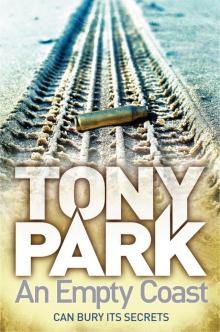 An Empty Coast
An Empty Coast Dark Heart
Dark Heart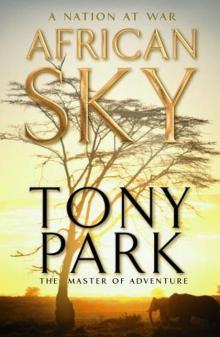 African Sky
African Sky The Delta
The Delta Captive
Captive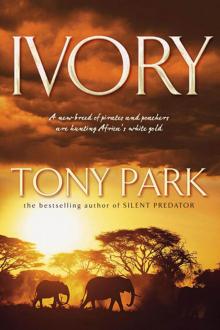 Ivory
Ivory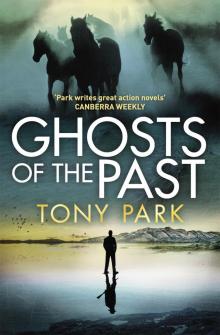 Ghosts of the Past
Ghosts of the Past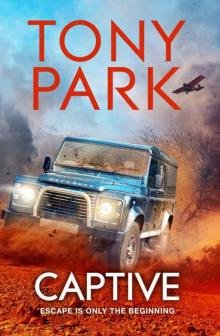 Captive_A High-octane And Gripping African Thriller
Captive_A High-octane And Gripping African Thriller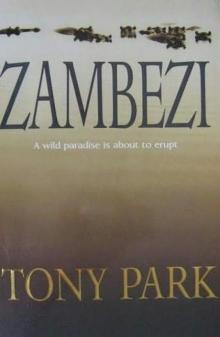 Zambezi
Zambezi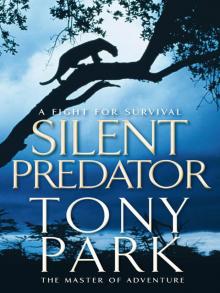 Silent Predator
Silent Predator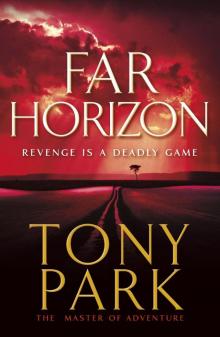 Far Horizon
Far Horizon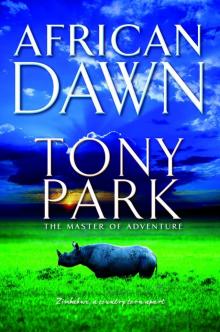 African Dawn
African Dawn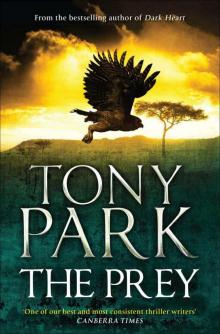 The Prey
The Prey Safari
Safari